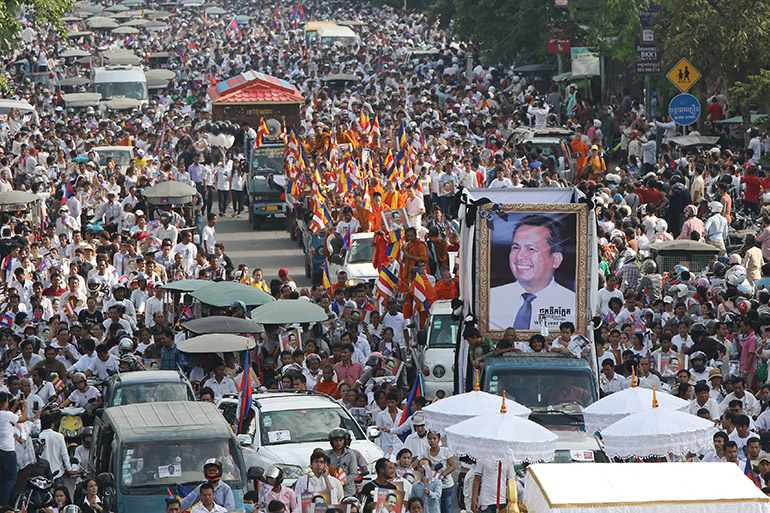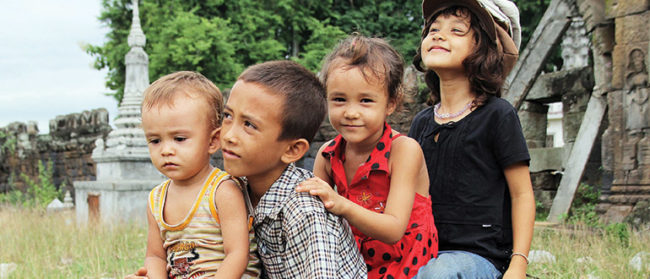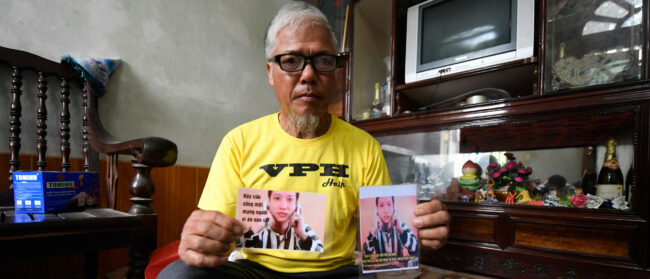Kem Ley was killed a year ago today. It was massive news, but few could have predicted just how much it would matter to so many people.
The cold-blooded murder has become the most stirring symbol of the suppression of dissent that has swept through Cambodia’s political and human rights arenas as tension builds ahead of the national election set for July 2018.
Kem Ley is commonly referred to as a political analyst, which is accurate but fails to capture the scope of his work or why thousands of Cambodians have made the trip to his home province of Takeo this week to pay their respects.
He was Cambodia’s preeminent voice of reason. A medical doctor by training, he spoke to Cambodian people through the radio, on his popular Facebook page and in person, holding workshops throughout the country to encourage people to make their voices heard.
In the year before he was shot dead, he helped start the Khmer for Khmer political advocacy group and the Grassroots Democracy Party, which aimed to challenge the status quo by empowering people to engage in politics on their own terms and with their own priorities.
In the year since, he has become a martyr for democracy and justice – his face both a reminder of the country’s dark history of political violence and a symbol of optimism for a brighter future in which Cambodians are in charge of their own destiny.
July 10, 2016: Kem Ley is shot dead just after 8:30 am while sitting down with coffee and newspapers at a gas station convenience store in central Phnom Penh. The suspected shooter is arrested within minutes. In a video released by police the day of the killing, he names himself as Chuob Samlab, or ‘Meet Kill’, and says he shot Kem Ley over an unpaid loan.
BREAKING: Political analyst Kem Ley shot dead; police confirm arrest of suspect #Cambodia https://t.co/v6IwJKSiOf pic.twitter.com/RQeQM6waxm
— The Phnom Penh Post (@phnompenhpost) July 10, 2016
July 24, 2016: Tens of thousands of mourners gather on the streets of Phnom Penh to bid farewell to Kem Ley in a mass procession that ended at his mother’s home in Takeo province, which would become something of a pilgrimage site. None of the country’s television stations covered the procession, a sign of the sensitivity and raw public sentiment surrounding it.
Sea of Mourners Carries Kem Ley Home: https://t.co/GHv2ZIEFNG pic.twitter.com/LOSolfZphJ
— The Cambodia Daily (@cambodiadaily) July 25, 2016
August 1, 2016: Prime Minister Hun Sen files a defamation lawsuit against then-opposition leader Sam Rainsy over a speech in which he called the killing of Kem Ley “state terrorism”. Despite being sentenced to 20 years in the case, Rainsy has stood by the claim, arguing that only the government had the ability to carry out such an act.
Cambodia PM sues Sam Rainsy over Kem Ley killing comments https://t.co/HGnkBfCWZl
— BBC News Asia (@BBCNewsAsia) August 2, 2016
August 28, 2016: Kem Ley’s pregnant wife, Bou Rachana, and four sons flee to Thailand out of fear for their safety. Rachana would give birth to the couple’s fifth son in October. The family, which hopes to be granted asylum in Australia, is still in Thailand awaiting a decision.
Family of slain activist Kem Ley flees Cambodia, friends sayhttps://t.co/NyreQpdRs6
— ABC News (@abcnews) August 30, 2016
December 13, 2016: Lawyers in California file a case against Chevron, the U.S-based firm that owns the gas station where the shooting occurred, demanding video surveillance footage of the scene. The company eventually said it had given all of the relevant footage to authorities in Phnom Penh.
A human rights activist is slain in Cambodia, and the mystery leads all the way to California https://t.co/AncGGVeSrU pic.twitter.com/8QlTJWx9gN
— Los Angeles Times (@latimes) February 11, 2017
January 12, 2017: New details about the case emerge in an Al Jazeera documentary, which says that Oeuth Ang, the former soldier arrested for murdering Kem Ley, had been seen meeting with authorities in Siem Reap in the days before travelling to Phnom Penh, where he would kill Kem Ley. Public screenings of the film in Cambodia have since been banned.
March 1, 2017: The trial of Oeuth Ang begins in Phnom Penh. It is widely ridiculed by observers. “The trial was significant not for what was revealed about the investigation, but for the important questions that remained unanswered,” said Kingsley Abbott, a senior international legal adviser at the International Commission of Jurists.
In a somewhat bizarre hearing, the only suspect in #KemLey‘s murder elaborated on his widely doubted story #Cambodia https://t.co/BevD2uQVSO
— The Phnom Penh Post (@phnompenhpost) March 2, 2017
March 23, 2017: The Phnom Penh Municipal court delivers a life sentence to Oeuth Ang, but does little to change the widely held view that the government was involved in the murder. “What happened was that the accused provided a version of events which were totally improbable, and they weren’t explored in any meaningful way,” Mr. Abbott said.
A Cambodian got a life sentence for killing a government critic. Even his name is in doubt. https://t.co/QAPuvDGBa4 pic.twitter.com/J4Ou4RsjLs
— New York Times World (@nytimesworld) March 23, 2017
June 9, 2017: Kem Ley’s friends, family and supporters begin to gather in his hometown ahead of a ceremony marking one year since his death. Although authorities have said the case remained open, there has been no indication since the sentencing that any further efforts are being made to investigate the case.
Dissidents, Opposition Turn Out for Kem Ley’s Memorial https://t.co/SxiQhTJfME
— The Cambodia Daily (@cambodiadaily) July 10, 2017
February 17, 2018: Kem Ley’s wife Bou Rachana and her five sons arrive in Australia after being granted with a special humanitarian refugee visa. They had been waiting for more than six months in Thailand. Victorian member of parliament Hong Lim tells Reuters in a statement that they were “very happy to finally have them here.”
Confirmed. They are in #Australia now. #KemLey pic.twitter.com/0Qj1Ra95lg
— Kem Ley (@KemLeyOfficial) February 19, 2018
July 9, 2018: Human Rights Watch release a statement on the eve of the second anniversary of Kem Ley’s murder, denouncing a lack of serious investigation into the killing. The statement urged the UN and other foreign donors to pursue justice for Kem Ley.
“Kem Ley apparently paid with his life for becoming a popular critic of massive corruption at the highest levels of government,” said Brad Adams, Asia director of Human Rights Watch. “The Cambodian government claims to respect the rule of law, but since Kem Ley’s murder the authorities have ignored all investigative leads and harassed critics who demand justice.”
July 10, 2019: Three men are arrested for commemorating the three-year anniversary of Kem Ley’s assassination at a gas station in Phnom Penh. Twin brothers Chum Hout and Chum Hour, along with another supporter Soung Neakpoan, are seized by the police while attempting to lay flowers at the site of Kem Ley’s shooting.
The twins are later released after signing a document pledging to refrain from “joining a movement for social unrest”, while Neakpoan is charged with “incitement to commit a felony” for distributing leaflets with the slogan “End extrajudicial killing”.
That same day, activist Kung Raiya along with his wife, parents-in-law and a nine-month-old baby are detained for selling t-shirts with Kem Ley’s portrait printed on them. Although his family members are later released, Raiya is charged with incitement. The charge carries a possible sentence of two years in prison.
Note: This article was updated on 18 July 2019 to include up to date information from 2019.


